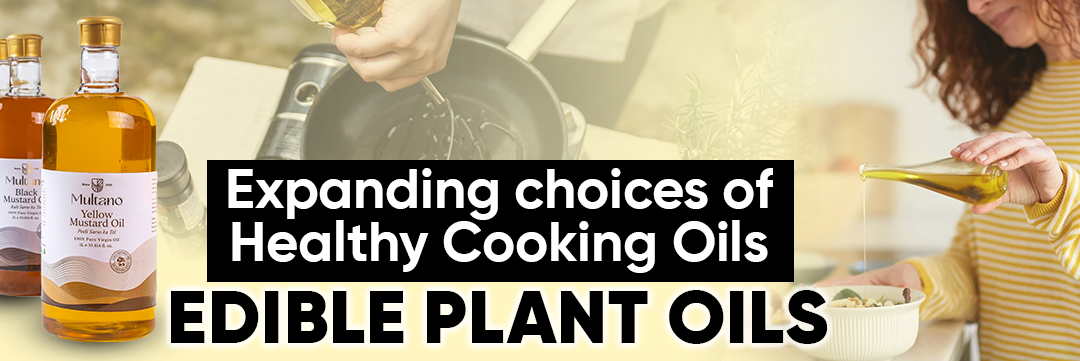Healthy diet as per experts comprises –vegetables, fruits, legumes, nuts, and seeds – mostly plant foods. The same is applicable to cooking oils that are extracted from plants such as olive, coconut or canola. There are many options of oil in the plant kingdom to add variety and flavor to one's meals. Plant oils are an indispensable source of certain nutrients important for human health.
Edible plant oils are extracted from the seeds, pulps, fruits and shoots of certain plants. Plant oils are a major source of energy in the human diet. Oils used in cooking can change the taste, color, flavor and fragrance of the food and also enhance the sense of satiety.
Edible plant oils have complex chemical properties and are generally rich in fatty acids, fat soluble vitamins, micronutrients and active compounds and also some flavoring substances. Plant oils contain fat soluble vitamins A, D, E and K. In addition, edible oils contain several antioxidants (like tocopherols, oryzanol, carotenes, tocotrienols, etc.
Plant oils have a high content of poly- and mono-unsaturated fatty acids. Both these types of fatty acids have the ability to improve good cholesterol (HDL) levels and also help to fight inflammation. This ratio, however, varies among the various oils of vegetable origin. For example soybean and corn oils have a high percentage of polyunsaturated fatty acids and olive, and safflower have high percentages of monounsaturated fatty acids.
Some oils such as soybean, canola, walnut and flaxseeds are rich in plant based omega-3 fatty acid also called alpha-linolenic acid (ALA), which may promote heart and brain health. Plant oils, such as sesame, corn, or canola oils, contain Phytosterols (plant sterols) which reduce the absorption of cholesterol (animal sterols), thereby helping to lower total and LDL cholesterol levels in blood.
Cooking oils form an integral part of Indian diets; however, one is confronted with an array of commonly marketed edible oils asserting a host of health claims. Therefore, right selection of edible oil is extremely important, especially in the Indian context, where cooking methods are different than in the west.
Indian cooking conditions subject oil to very high temperatures, like in deep frying during which the oil temperatures can go above 170 °C. It has been demonstrated that certain oils, especially refined oils with high PUFA, can degrade easily to toxic components like free radicals, and trans-fats. These free radicals and trans-fats are not good for heart health and also for general health.
High temperatures also result in loss of antioxidants (like tocopherols) and sterols, produce free radicals and TFA, and polymeric components, which may produce blockages in the arteries and even cause cancer. Oils that are high in saturated fats like ghee/coconut oil are ideal for deep-frying, as they are more stable.
High heat causes molecules in oils to break apart, burn, become bitter, lose nutrients, and release smoke. Most oils have a "smoke point" between 400° and 500° F. This point is reached only during deep fat-frying. Also, deep-fat-frying causes foods to absorb more oil and adds more calories to the diet.
Cold-pressed oils are counted as one of the best vegetable oils. Cold Pressed Oils are rich in vitamin A, C, E, D, fatty acids omega 3 and 6, zinc and potassium. These nutrients help in protecting the liver from oxidative damage. These also help to maintain the level of cholesterol and boost the immune system. The presence of antioxidants in these oils are very useful to minimize the risk of chronic diseases and cancer formation.
Sturdy oils that have a high smoking point are good for sautéing, stir-frying, or roasting foods include canola, corn, olive oil, peanut, rice bran, safflower, soybean, and sunflower oils.
Oils that have a low smoke point can lose flavor and structure quickly at high heat, so they’re better for drizzling on food or using in a salad dressing. These include flaxseed oil, extra-virgin or virgin olive oil, certain nut oils (almond, walnut), and sesame oil.
The type of plant oils to use for cooking depends on the dish and taste preference. Some cuisines taste best with certain oil flavors. For example, almond, peanut and sesame oils are good for Asian cooking; Middle Eastern foods taste best in olive and sesame oils and For Mediterranean diet olive oil is the best. If you want a neutral oil that won’t overpower food, use canola, safflower, or sunflower oil. For a stronger flavor, try flaxseed or nut oil.
Take Home Message : Plant oils are healthy fats, but like all fats, they’re high in calories. One gram of fat has more than twice the number of calories as one gram of carbohydrates or protein. For each tablespoon of olive or canola oil you’re getting about 120 calories per tablespoon, so one needs to use oils judiciously.
Ms Sunita Roy Chowdhury, Senior Nutritionist, Dietician and Nutrition Educator
Healthynudgez and Guiding Stars Open Learning Academy,
Under the banner of SS Guiding Stars Pvt. Ltd.
Disclaimer
At Multano we are passionate about helping people make their lives healthier and happier. All information provided in this article is researched and authenticated by qualified experts. We are dedicated to providing reliable and accurate information to our readers. However, please use the information provided here with discretion. Any changes in medication/diet must be done with the approval of your treating medical practitioner/Dietician only.


